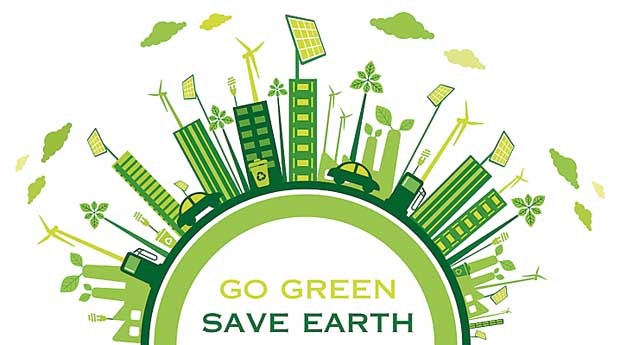Reply To:
Name - Reply Comment
Last Updated : 2024-04-19 09:27:00

At a time when the world is engaged in an expedition of creating a greener tomorrow by means of eco-friendly products and renewable energy, the people themselves seem to have felt the pulse of man-made anthropogenic disasters. Today, the nature has started to reciprocate in such a manner that people have paused to sit and think of a way to recover an environment that has gravely suffered destructive human activities. After all, many of the natural catastrophes are direct results of human  actions, either intentional or impulsive. The people of today have finally fathomed the realities of life, that to lead a good life, he or she should co-exist with the environment and preserve the limited resources for the future generations.
actions, either intentional or impulsive. The people of today have finally fathomed the realities of life, that to lead a good life, he or she should co-exist with the environment and preserve the limited resources for the future generations.
Events that lead to modern green living are perhaps the outcome of human activities practiced centuries ago. Plastic and polythene were invented for the convenience of people and not to endanger their lives.
But headlined in newspapers and other form of media are the cons of using plastic and polythene; polluting water bodies, soil and air by contributing to global warming. In the natural process, these burned polythene and plastics are absorbed by clouds and sent back to earth and absorbed by the soil.
They are then passed on to trees from which people consume the bearings. The chain of destruction we cause to nature therefore is an endless cycle.
According to Dr. Prashantha, the green concept is heavily dependent on human efforts. “If humans can use fewer raw materials for production, a lot of resources could be saved. We will be able to reduce environment pollution by limiting the consumption of power and water,” he said.
According to the water footprint, it is calculated that at least10 litres of water are used to produce one slice of bread, 2,400 litres to make a quality t-shirt and a significant 2,500 litres to make a hamburger. People are unaware of the volumes of water used for these productions. To make matters worse, water usage has increased over the years in the wake of new productions. ‘Going green’ does not solely mean using organic productions, but also minimising waste.
Spending money lavishly for unnecessary goods is a total waste. People should remember that by making unnecessary purchases, they contribute to preserve the environment. If people waste their money because they own it, they are unbalancing a system that is invisible to the closed mind.
Production should be limited to manufacturing the essentials. Overproduction outweighs sustainability. This is an unending vicious cycle. People are allured to impulsive buying and consuming things. By engaging in this cycle, vital resources such as power, water and raw materials are wasted and the environment polluted. If some product corrupts the mind of a consumer, that is an unrecorded pollution. The consumption of alcohol is yet another example of mental pollution. Experts have forecast that 90% of the world’s drinking water will be exhausted by 2025 and the rapid population growth population is one of the key reasons.
Overindulgence of food is making people sick, especially with non-communicable diseases such as obesity, diabetes and high blood pressure. On the other hand, medicine production needs power and materials. The biggest issue in creating an unnecessary temptation to buy things is a result of diversification of customer goods. Merchants will try to sell anything in this consumerism capitalised societies, but it is us, the consumers who have to be aware of the temptations. If a person buys, for instance, five t-shirts, someone else misses his or her chance to get hold of them, thus creating the need for more production.
Japan practices the 5S concept with a long-term vision and it is taught to children at an early age. When they become adults, they are going to be the expected “ideal citizen.” In Sri Lanka, we too have to teach our future generations of sustainable living practices.
Non-renewable energy is limited and the human race is already facing the challenge of finding other alternatives for generating power. Many bio-fuels have been invented and are in use. Water will become a limited resource by 2030. The world already lacks enough resources for the fast growing population.
In Sri Lanka, we have a unique food culture, prosperous agriculture and completely sustainable lifestyle. All what we had in the past are being forgotten by our own people. They knew much better on how to use resources sustainably.
Excess polythene and plastics are circulating in the market. If observed carefully, these products are slowly replacing household utensils that were originally made from wood, steel, glass and other harmless material. Markets are overflowing with unnecessary plastic products with a very low price and inferior quality.
The people however resort to buy those affordable products to store food. The exact material in cheap plastics is unknown most of the time, but is definite that those are unhygienic. Some household utensils made of plastics that react to heat.
When food is stored in them, they undergo several chemical changes thereby increasing the risk of forming carcinogens. We use many plastics only once and throw them in garbage. From that moment on, the environment has to deal with the ill effects of plastics.
A4 papers are not just papers but the result of a very long production process that consumes gallons of water. It takes upto 40 litres of water to make a single page. The world is aware of the wastage done by paper production, and most of the responsible institutions are cross-cutting the paper usage.
Overproduction is related with consumerism. NCD (Non - Communicable Diseases) is yet another threat we Sri Lankans face. In the journey of passing a low-income country limit to a high-income country, the higher levels of society have respiratory related NCD risks.
Modern man will walk to 2050 with many problems.
The breaking down of petroleum era will give birth to a lot of other socioeconomic issues. Who can say that using garbage as a fuel has not contributed to global warming? The Middle East and African regions are to suffer severe water shortages in future and that could lead to many political, economical and social issues. Petroleum decaying will lead to a recession of petrochemical production, which is used as the main material in plastic production. And the plastic era will have to de-crown itself.
Modern capitalism is a mixture of materialism and idealism. Materialism is based on the development of science and technology. Idealism is based on the mind and in accordance with religion, gods and the soul.
The capitalist politics use religion as a tool to control people.
People in the past 100 - 150 years have used natural resources limitlessly, without thinking about the results. They were unable to manage natural resources and that has led to complications the modern world is facing. The results have become critical for the present and the future societies.
Sustainable living can be started with the family. Curtailing unnecessary expenses, avoiding impulsive purchasing, growing fruits and vegetables at home and minimising polythene and plastic usage are a few ways to practice this.

Add comment
Comments will be edited (grammar, spelling and slang) and authorized at the discretion of Daily Mirror online. The website also has the right not to publish selected comments.
Reply To:
Name - Reply Comment
On March 26, a couple arriving from Thailand was arrested with 88 live animal
According to villagers from Naula-Moragolla out of 105 families 80 can afford
Is the situation in Sri Lanka so grim that locals harbour hope that they coul
A recent post on social media revealed that three purple-faced langurs near t